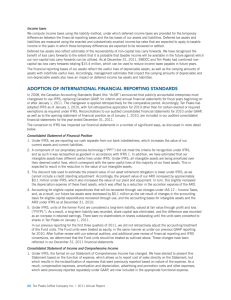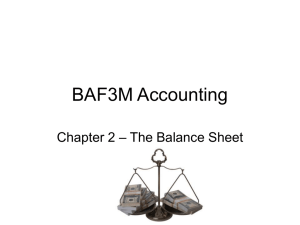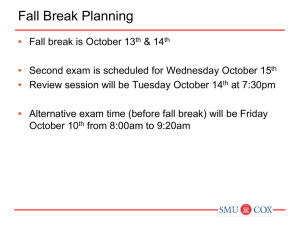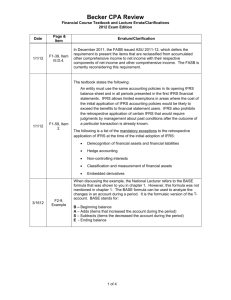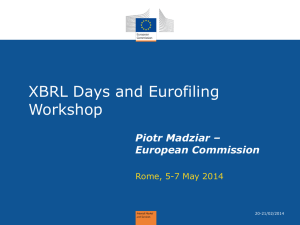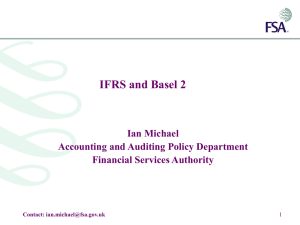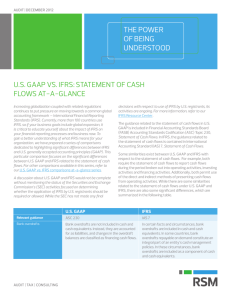New release announcing QT - MOI comments (00347716
advertisement
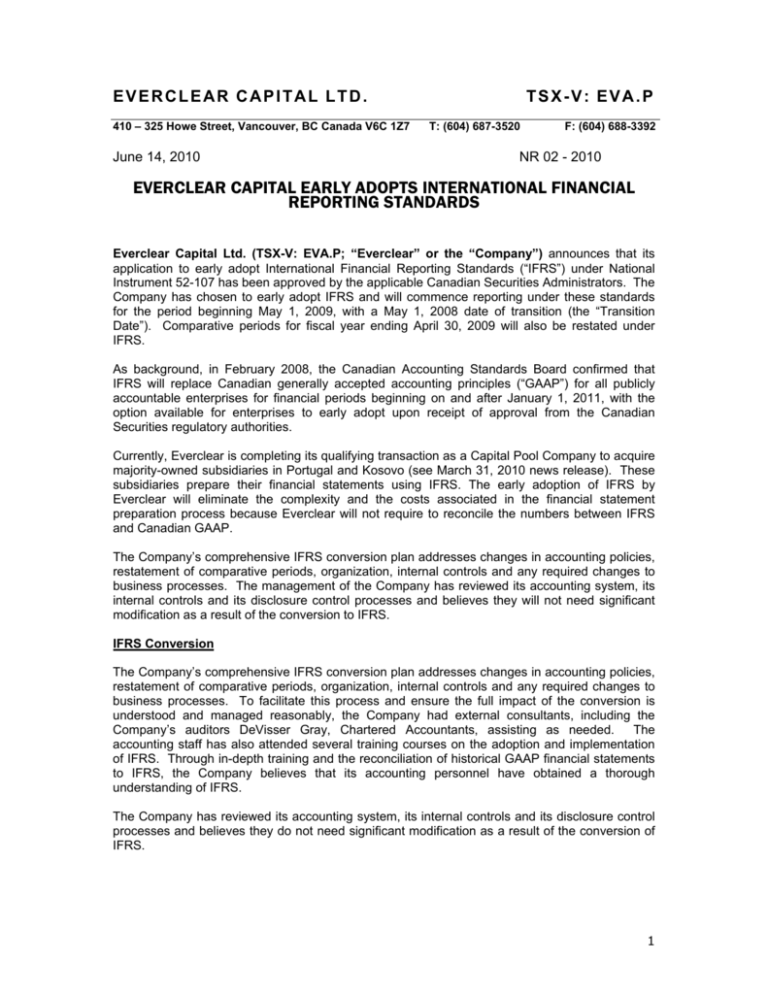
EVERCLEAR CAPITAL LTD. 410 – 325 Howe Street, Vancouver, BC Canada V6C 1Z7 June 14, 2010 TSX-V: EVA.P T: (604) 687-3520 F: (604) 688-3392 NR 02 - 2010 EVERCLEAR CAPITAL EARLY ADOPTS INTERNATIONAL FINANCIAL REPORTING STANDARDS Everclear Capital Ltd. (TSX-V: EVA.P; “Everclear” or the “Company”) announces that its application to early adopt International Financial Reporting Standards (“IFRS”) under National Instrument 52-107 has been approved by the applicable Canadian Securities Administrators. The Company has chosen to early adopt IFRS and will commence reporting under these standards for the period beginning May 1, 2009, with a May 1, 2008 date of transition (the “Transition Date”). Comparative periods for fiscal year ending April 30, 2009 will also be restated under IFRS. As background, in February 2008, the Canadian Accounting Standards Board confirmed that IFRS will replace Canadian generally accepted accounting principles (“GAAP”) for all publicly accountable enterprises for financial periods beginning on and after January 1, 2011, with the option available for enterprises to early adopt upon receipt of approval from the Canadian Securities regulatory authorities. Currently, Everclear is completing its qualifying transaction as a Capital Pool Company to acquire majority-owned subsidiaries in Portugal and Kosovo (see March 31, 2010 news release). These subsidiaries prepare their financial statements using IFRS. The early adoption of IFRS by Everclear will eliminate the complexity and the costs associated in the financial statement preparation process because Everclear will not require to reconcile the numbers between IFRS and Canadian GAAP. The Company’s comprehensive IFRS conversion plan addresses changes in accounting policies, restatement of comparative periods, organization, internal controls and any required changes to business processes. The management of the Company has reviewed its accounting system, its internal controls and its disclosure control processes and believes they will not need significant modification as a result of the conversion to IFRS. IFRS Conversion The Company’s comprehensive IFRS conversion plan addresses changes in accounting policies, restatement of comparative periods, organization, internal controls and any required changes to business processes. To facilitate this process and ensure the full impact of the conversion is understood and managed reasonably, the Company had external consultants, including the Company’s auditors DeVisser Gray, Chartered Accountants, assisting as needed. The accounting staff has also attended several training courses on the adoption and implementation of IFRS. Through in-depth training and the reconciliation of historical GAAP financial statements to IFRS, the Company believes that its accounting personnel have obtained a thorough understanding of IFRS. The Company has reviewed its accounting system, its internal controls and its disclosure control processes and believes they do not need significant modification as a result of the conversion of IFRS. 1 Initial adoption of IFRS IFRS 1 “First-time Adoption of International Financial Reporting Standards” sets forth guidance for the initial adoption of IFRS. Under IFRS 1, the standards are applied retroactively at the Transition Date with all adjustments to assets and liabilities taken to retained earnings unless certain exemptions are applied. The Company will be applying the following exemptions to its opening balance sheet dated May 1, 2008: (a) Business combinations IFRS1 indicates that a first-time adopter may elect not to apply IFRS 3 Business Combinations retrospectively to business combinations that occurred before the date of transition to IFRS. The Company takes advantage of this election and applies IFRS 3 to business combinations that occurred on or after January 1, 2009. There is no adjustment required to the May 1, 2008’s statement of financial position on the Transition Date. (b) IFRS 2 - Share-based payment transactions IFRS 2 Share-based Payment has not been applied to equity instruments that were granted on or before 7 November 2002, nor has it been applied to equity instruments granted after 7 November 2002 that vested before May 1, 2008. (c) IAS 27 – Consolidated and Separate Financial Statements In accordance with IFRS 1, if a company elects to apply IFRS 3 Business Combinations retrospectively, IAS 27 Consolidated and Separate Financial Statements must also be applied retrospectively. As the Company elected to apply IFRS 3 prospectively, the Company has also elected to apply IAS 27 prospectively. Impact of IFRS IFRS employs a conceptual framework that is similar to Canadian GAAP. The adoption of IFRS will not have any material impact on the financial information previously disclosed under Canadian GAAP. The Company identified one adjustment as a result of the adoption of IFRS: (a) “Contributed surplus” versus various reserves in equity IFRS requires an entity to present for each component of equity, a reconciliation between the carrying amount at the beginning and end of the period, separately disclosing each change. The Company examined its “contributed surplus” account and concluded that as at the Transition Date and July 31, 2008, there was no “Contributed surplus” account. As at April 30, 2009, $39,574 in the “Contributed surplus” account relates to “Equity settled employee benefit reserve” and $6,993 relates to “Reserves for warrants”. As a result, the Company reclassified in the equity section between “Contributed surplus” and the various reserve accounts totaling $46,567. 2 In order to allow the users of the financial statements to better understand other changes between IFRS and GAAP that do not have any quantitative effect or adjustments to the Company’s financial statements, the following qualitative explanation of the differences between GAAP and IFRS is provided: (a) Stock based compensation GAAP – The fair value of stock-based awards with graded vesting are calculated as one grant and the resulting fair value is recognized on a straight-line basis over the vesting period. Forfeitures of awards are recognized as they occur. IFRS – Each tranche of an award with different vesting dates is considered a separate grant for the calculation of fair value, and the resulting fair value is amortized over the vesting period of the respective tranches. Forfeitures estimates are recognized in the period they are estimated, and are revised for actual forfeitures in subsequent periods. (b) Income tax Income tax expense is calculated in the same manner in accordance with GAAP and IFRS. Future income tax asset / liability is also calculated in the same manner in accordance with GAAP and IFRS. (c) Property, plant and equipment GAAP and IFRS allow the use of original cost less depreciation as the cost base. IFRS requires separate depreciation rate for components that depreciate differently. (d) Exploration for and Evaluation of Mineral Resources GAAP and IFRS allow the capitalization of costs associated with the exploration for and evaluation of mineral resources. On behalf of the Board, “Mark T. Brown” Mark T. Brown CA President & Director Neither the Toronto Stock Exchange (TSX) nor the NYSE Amex have reviewed or accepted any responsibility for the adequacy or accuracy of the contents of this news release which has been prepared by management." Statements contained in this news release that are not historical facts are forward looking statements as that term is defined in the private securities litigation reform act of 1995. Such forward -looking statements are subject to risks and uncertainties which could cause actual results to differ materially from estimated results. Such risks and uncertainties are detailed in the Company's filing with the Securities and Exchange Commission. 3
